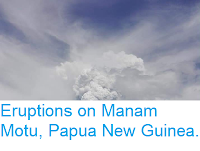At least ten people have died after a landslide hit the village of Duanigle Gowe in Simbu Province, Papua New Guinea, on the morning of Friday 10 April 2020. The landslide is reported to have buried several houses as well as shops, gardens, farms, a church and a Trout farm. Eight of the dead have been identified as staff at the Mt Wilhelm Secondary School in the village, a senior teacher and three of his five children, plus a cook, his wife and two children. April marks the end of the Monsoon Season in Simbu Province, with rainfall decreased from the peak in March but still high. Landslides
are a common problem after severe weather events, as excess
pore water pressure can overcome cohesion in soil and sediments,
allowing them to flow like liquids. Approximately 90% of all landslides
are caused by heavy rainfall.
Debris left by a landslide that hit the village of Duanigle Gowe in Simbu Province, 10 April 2020. Loop PNG.
Monsoons are tropical sea breezes triggered by heating of the land during the warmer part of the year (summer). Both the land and sea are warmed by the Sun, but the land has a lower ability to absorb heat, radiating it back so that the air above landmasses becomes significantly warmer than that over the sea, causing the air above the land to rise and drawing in water from over the sea; since this has also been warmed it carries a high evaporated water content, and brings with it heavy rainfall. In the tropical dry season the situation is reversed, as the air over the land cools more rapidly with the seasons, leading to warmer air over the sea, and thus breezes moving from the shore to the sea (where air is rising more rapidly) and a drying of the climate.
Diagrammatic representation of wind and rainfall patterns in a tropical monsoon climate. Geosciences/University of Arizona.
See also...
Follow Sciency Thoughts on Facebook.








